6 Point Guide to Put an End to Debt

One of the best investment a person can make is – paying off a debt
However not many don’t think progressively and instead do the opposite. For e.g. Pay with a credit card and then repay it off in tranches in months” putting them into a debt problem. Bad financial decisions (besides giving you sleepless nights) prevent you from having an financial ‘cushion’ for emergencies. Getting into debt, means jeopardizing of future income that can be used for basic necessities such as paying the school fees in advance, or saving money to cover an unforeseen event such as a medical emergency, car breakdown, etc.
For this reason, “there is no better investment than paying off a debt”.
There are some warning signs, which indicate that your finances are not in order. For example:
If you do not have enough capital to pay your monthly bills and are unable save even a minimum 10% each month; then something is wrong, maybe you are living beyond your means.
There is a myth that people with ‘financial health’ have a natural gift for managing money. The reality is that making ends meet and starting to build wealth is not a matter of luck, but of discipline and perseverance. If you are one of those who see their money in bank account in a danger zone month over month and at the end of the year, then realize that your ability to pay has declined and it is time to make a plan to control your expenses and free yourself from the dreaded debts.
6 Point Guide to Reduce and End your Debt
(1) Failure to manage money
The first step is to accept the fact that you have a problem in managing your money.
Ask yourself, first, why am I in this situation? Diagnosing a problem is an important aspect to start cleaning up finances. And it is useless to have a complete plan if you do not change your behavior on organizing the money and meeting the expenses.
If you find it hard to decide why you are in debt, discuss with another person who can talk to you about behaviors that you refuse to recognize. For example, the desire to spend your paycheck on buying something unessential even if you have to pay cards or visit the doctor. You can also take help of debt negotiators like CuraDebt who can help you out in debt settlement and tax debt relief.
Some other tasks that you can develop to strengthen your wallet are the following:
(2) List down and categorize all your debts
Write down all your debts, divide them into big and small, and specify how much interest you pay. The most classic examples are: credit card expenses, car loans, education, home loan, etc.
Focus on paying off the smallest debts. Paying off it first, generates a positive psychological impact, which encourages you to move forward and repay the remaining debt. The debt of a car loan, for example, is agreed at a certain time, so the credit card is the payment likely to be reduced in less time along with those of catalog purchases, known as ‘immediate maturity’.
The smartest way to use the card is to pay the debt in full. If you have made this commitment with several banks and department stores, get up the courage and take out the total amount. Analyze the last three account statements; it is advisable to pay the one with the highest interest rate, without failing to cover at least the minimum (or more if possible) required by the others.
As you pay, you will have some liquidity, the great temptation could be to spend what you generate in balance. Make it a rule “not to touch that money” and be careful with the famous “interest-free installments” for several months.
Analyze if it works for you to transfer the balances of your credit cards to another one that accepts this plan. But before taking this step, you should find out the conditions and limits of the institution with which you establish the transaction, since the interest rate will depend on your credit history and could be higher than expected.
When you get out of debt, avoid the temptation of managing more than two cards, you can have one to keep better control of your expenses and take advantage of the benefits of membership programs. The second one can only be used to get out of unexpected situations.
(3) Set your limits
The fact that you have a heavy debt does not mean that you should resign yourself to spending several years paying and you have the luxury of forgetting a payday. Keep a calendar of when your payment is due and if you can, pay extra. In the case of credit cards, late payments result in a late payment fee. It is also not advisable to assume the role of “no longer liquid”, that will cause you to be reported to the Credit Bureau, which affects your credit history and limits the possibility of obtaining new credit.
(5) Write your expenses
The basic thing irrespective of whether you are in a debt or not is to be able to make payments but to keep a monthly budget of your expenses, so that you know exactly the inflow, outflow and the balance left at the end of the month to pay off debts and where you can save to speed up the repayments.
Writing down all your expenses in detail will help you make aware of how to modify your consumption pattern. Take note:
(i) In a special notebook (pocket friendly), write down on one side your income, i.e., how much is the inflow of money? Fixed salaries or and if you have alternate sources by working on extra income sources).
(ii) On the other side write down your expenses by category, for example:
Transportation: Money spent on gas, repairs, maintenance, and insurance. Even if some of these are done two or three times a year, establish an average monthly investment. Think, for example, how much do you need to save each month for the insurance payment?
House: Electricity, water, telephone, Internet service, cable TV, gas, maintenance or payment of any credit.
Food: Make an approximate budget of how much you spend in restaurants, cafeteria, etc. If you prepare at home, how much you spend on the purchase of products.
Recreation: Trips to the movies, theater, concerts, travel or any other entertainment.
Health: Regular medical check-ups, dentist, periodic medicine purchase.
Insurance: Life insurance, medical expenses, education insurance for your children (those with a quarterly, semi-annual or annual periodicity, calculate the corresponding monthly amount).
Education: School, private classes, other courses.
Debt Payment: What you have to pay monthly and how much.
Miscellaneous expenses: This is a fundamental segment because this is where you can adjust your budget and have extra savings to allocate to debts. Put the lid on leaks you have per month, no matter how insignificant they may seem. Because these are the ones that make you lose control of your finances: catalog purchases, cosmetics, hairdressing, laundry, dry cleaning, spa visits, birthday gifts, among others.
When you receive your paycheck, dedicate yourself immediately to cover your commitments and pay your debts. If you share a house, for example, discuss with the other person(s) the changes you want to make to have more cash and get out of debt.
To identify how you manage your money, get in the habit of writing down the way you spend it. Every time you buy, ask for a receipt and keep it for 30 days in a box. Do this exercise for two to three months in a row and you will realize where you have leakage of money.
(6) Small is Big
You should pay attention that is, the money in smaller amount without realizing it. For example: the daily purchase of a coffee and a pizza. In the long run, these end up becoming a good part of your salary. Take out your list, these are some common examples:
- A daily coffee: $10 a day (depending on where you buy it) over 300 per month.
- Beauty salon: Hair straightening with a treatment every 15 days at $50. $100 per month.
- Massage: $50 per month, per year more than $600.
It is very important that you do not enter into any new debts till the time you repay the existing one. The money saved on miscellaneous expenses should be treated as a bonus and used as an ‘accelerator’ factor.


Hi, I am Nikesh Mehta, owner and writer of this site. I’m an analytics professional and also love writing on finance and related industry. I’ve done online course in Financial Markets and Investment Strategy from Indian School of Business. I can be reached at [email protected].



